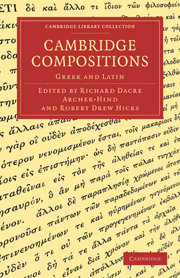TRANSLATIONS INTO LATIN VERSE
Published online by Cambridge University Press: 07 September 2010
Summary
FEAR no more the heat o' the sun,
Nor the furious winter's rages;
Thou thy worldly task hast done,
Home art gone, and ta'en thy wages:
Golden lads and girls all must,
As chimney-sweepers come to dust.
Fear no more the frown o' the great;
Thou art past the tyrant's stroke;
Care no more to clothe and eat;
To thee the reed is as the oak:
The sceptre, learning, physic, must
All follow this, and come to dust.
Fear no more the lightning-flash,
Nor the all-dreaded thunder-stone;
Fear not slander, censure rash;
Thou hast finish'd joy and moan:
All lovers young, all lovers must
Consign to thee, and come to dust.
No exorciser harm thee!
Nor no witchcraft charm thee!
Ghost unlaid forbear thee!
Nothing ill come near thee!
Quiet consummation have;
And renowned be thy grave!
Shakespeare. Cymbeline, Act iv. Scene ii.IMMODICUM solis fuge formidare calorem
nee faciat brumae vis furibunda metum:
omne peregisti pensum mortale larique
reddita mercedem sedulitatis habes.
aureus ipse puer, par a fuligine furvis,
et virgo fati foedere pulvis erit.
triste supercilium fuge formidare potentum,
in te praeventast plaga minacis eri.
desine vestitum curare et desine victum,
robur Iiarundinibus iam tibi praestat idem,
hanc sceptrum doctrina viam medicina sequentur
omniaque haec certo foedere pulvis erunt.
fulgura cum telo fuge formidare trisulco,
cuius ad horrisonas cor pavet omne minas;
nil hominum linguas, temeraria probra timeto,
quod placeat superest displiceatve nihil.
consignabit amans pariter tibi floridus omnis,
omnis amans certo foedere pulvis erit.
nulla tuos ausit mala saga lacessere manes,
nemo veneficiis illaqueare velit,
impacata vagis simulacra meatibus a te
abstineant, a te sit procul omne malum. […]
- Type
- Chapter
- Information
- Cambridge CompositionsGreek and Latin, pp. 1 - 122Publisher: Cambridge University PressPrint publication year: 2009First published in: 1899



